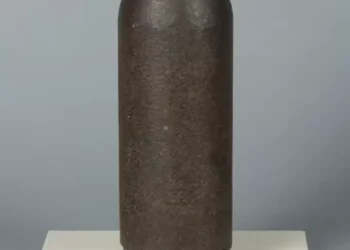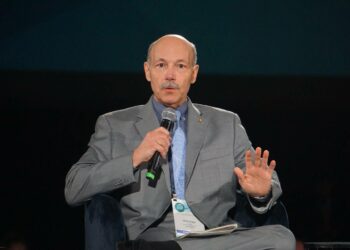All Matty Hannon wanted to do was go on an epic surf adventure from one end of the American continent to the other, and document it. What he ended up doing was creating a DIY masterpiece with the power to change millions of lives if not the course of mainstream surf culture itself. “The Road To Patagonia” — which is Australia and New Zealand’s highest grossing documentary for 2024 so far — is a love and adventure story set against a backdrop of stunning nature and pumping waves with a revolutionary bent to it.
Having spent five years living in the jungles of Sumatra with the Indigenous people of the Mentawai, Hannon’s understanding of the schism between nature-based communities and the Western capitalist consumer model is profound and finds its mark in this film. He picked up the phone from Surfer as he was preparing to depart for the New Zealand leg of the tour. Hannon is in negotiation with American streaming services with a release date soon to be announced.
SURFER: You’ve finished the Australian leg of the tour where you sold out nearly every venue. Talk us through the experience so far.
Matty Hannon: It was amazing, man. There were some really beautiful theatres we got to screen the film at that were just an incredible space to be in, and it was a bit surreal standing up in front of all those people and sharing your story. But the big thing for me was the feedback we’re getting off people who’ve said it touched them deeply. It’s a massive reward for a creative venture. For instance, in Coffs Harbour, which was a really fun screening, we had an Indigenous fella stand up impromptu at the end of the film, in front of the entire audience and say, “Well, I didn’t really know what this film was about and I just got dragged along here by my mate, but I’m so glad I did, ‘cos it’s one of the best films I’ve ever seen. I’d just like to give you guys a big welcome to Gumbaynggir country and thank you for moving here, and I’d like to thank your ancestors for bringing you here.” I almost shed a tear up on stage, him doing that — with the history of what has happened here in Australia — that he felt compelled. There were a couple of screenings where we had similar reactions. That was one of the biggest highlights, just seeing how this story affected people on an emotional level.
I’m not surprised. I think it’s impossible not to have that kind of reaction when you see this film. What are some of the themes that have emerged in the feedback?
Most people have been coming to us and saying that it affected them emotionally, and a lot of people have said it shifted a bit of perspective in their lives. Everyone’s lives are different so you can’t box that up, but it does sound like it made people stop and think and analyze where they want to be going, and a lot of the time linked in with how they’re experiencing the natural world, the physical world. That would be the most common reaction.
What do you hope are some of the outcomes from this film?
It’s just a small independent documentary. I’m not expecting it to change the world, but I do like the idea of films that give people space to dive into their dreams and hopes and just stop and be able to reflect on this trip that is life, and how they fit within it, and what they want to be feeling and looking back on when it’s your time to meet the maker.
On a bit more of an issue-based front, I do want people to be triggered into having conversations about how we as humans relate to the world, especially in the face of the environmental crisis that we’re facing on every single bloody level. And not just environmental, it’s a bit of a spiritual crisis we’re dealing with in humanity, isn’t it? It doesn’t matter where you look, whether it’s in our own backyards, Europe or the Middle East or our own countries that are sponsoring wars. And all this shit that we’ve been told, how we’re the bastions of the free world of human rights of ethics and progress, and yet here we are with our leaders lying to our faces and destroying the living world on so many levels.
TheRoadToPatagonia.com
” data-src=”https://s.yimg.com/ny/api/res/1.2/RC_tE9E2cAReCuTn.NtLRg–/YXBwaWQ9aGlnaGxhbmRlcjt3PTk2MDtoPTY0MA–/https://media.zenfs.com/en/surfer_magazine_140/18ca898f165caa12f79a20dbe319f167″/>
You’ve sold out so many shows, that must be validating?
I think it means that these themes are what people are hungry for — that there’s a lot of people out there who feel similarly in the ocean or forest, and who are not content with the way the world is going. Perhaps because of the disconnection to nature and the rampant consumerism and all the rest we’ve talked about. Whereas that beautiful magic seems to be slipping a little bit when we look at society’s values as a whole. It doesn’t seem to be on the right trajectory as far as regaining that human experience.
It’s so true. One of the things that comes out of your film is the motivation to reconnect with that human experience, which can only be found in nature.
With all the marketing and technology and all the rest of it, it’s so easy to get sucked into disconnection. Whether it’s the doom-scrolling or the 9-5 screen time at work, which ends up defining us, because how we spend our days is how we spend our lives. Very often we’re too time-poor to stop, we’re bound to the system that keeps us grinding and addicted.
I reckon it’s the reconnection that we crave. Surfers are a perfect example of that, we structure our lives around the rhythms of tide, wind, swell and sand. We salivate at the prospect of finding that perfect morning when everything coalesces. But we also know that those perfect waves are incredibly fleeting and only a small part of the overall surfing lifestyle. The rest of it, that which gives us our identity, our compass and contentedness in life, is formed by spending a lot of time dreaming in the lineup, hiking the dunes, hunting the maps, struggling against the sweep, eating the freshly speared fish, laughing with your mates and camping by a fire under the stars. That’s why most of us love surfing so much I reckon, because it brings us back to the physical reality of being human.
So, how does one maintain that sense of nature and humanity in the world we live in today?
I’m getting way out of my lane here, and nothing’s ever black and white, I feel like the world is full of people pointing fingers and screaming accusations at the other half, but ‘Dualism’ or Cartesian philosophy is a big part of the reason we’re in this mess in the first place. Black vs white, man vs woman, human vs nature, right vs left, etc. The media feeds off that division, and then profits from it.
It’s such a balancing act because you have to play the game in order not to suffer the consequences (like getting a mortgage for a roof over your head), but also try and walk the line of living a life that is true to who you are.
TheRoadToPatagonia.com
” data-src=”https://s.yimg.com/ny/api/res/1.2/zu1Lw7GKitRcOgTtoVycEA–/YXBwaWQ9aGlnaGxhbmRlcjt3PTk2MDtoPTY0MA–/https://media.zenfs.com/en/surfer_magazine_140/adcdb36a39694b3f60bfe98142d163a7″/>
The beauty of this film is that in foyers and cafes around every one of these premieres would have been filled with people having these kinds of conversations. And you didn’t tell people to have these conversations, you don’t beat people over the head with your message. It’s the message that comes from the characters and experiences shared in this film and there’s just this undeniable synchronicity between people from the jungles of the Mentawai all the way to the tip of Alaska all the way to Patagonia that creates this kind of dialogue.
Thank you. It’s been a massive, massive journey, on a tiny budget, shot with the most rudimentary technology, but those aspects of it, the DIY ethos, is exactly why it hits so hard. You could have had the biggest budget in the world, and you would have captured none of what you captured.
It’s funny isn’t it, how money can corrupt sometimes, or a lot of the time… it just prevents you from being able to capture the smaller moments and the magic, and it can overwhelm the subjects, and pollute the experience to drain it of all authenticity and, as a result, impact.
I think that’s one thing people relate to in the film, that it is real and heartfelt. You can’t really fake the stuff that we went through, or some of the moments that we accidentally captured on camera. In a mainstream world where shiny and beautiful things lead the way, it’s maybe refreshing for some people to see a more salty and gritty take on life. Ironically enough I just found out this morning that it’s the number one documentary at the box office here in Australia and New Zealand so far this year. I’m definitely not going to be able to stop working or anything like that, but I’m very grateful that it’s getting out there and my reward is in these kind of conversations that you and I have just had, and hopefully the conversations others might have down the track.
Related: Patagonia Takes Its Shot At ‘Cheap Crap’
Related: Australian Shaper and American Designer Collab on Asymm 7,000 Miles Apart
Source link : http://www.bing.com/news/apiclick.aspx?ref=FexRss&aid=&tid=66b90842a39b48798c63da94218eb891&url=https%3A%2F%2Fwww.yahoo.com%2Fentertainment%2Falaska-patagonia-motorcycle-matty-hannon-172906808.html&c=5090889844626023233&mkt=en-us
Author :
Publish date : 2024-08-11 06:29:00
Copyright for syndicated content belongs to the linked Source.







